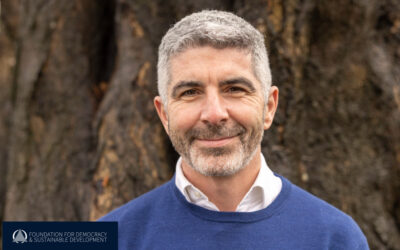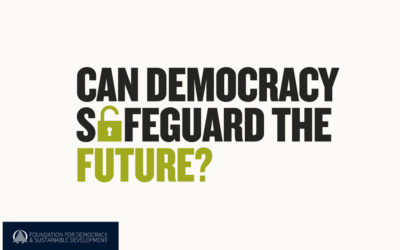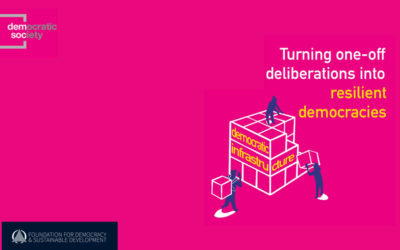The 2013 Oxford Martin Commission for Future Generations’ Now for the Long Term comprehensively analyses short-termism in society, politics and business and calls ‘for a radical shake-up … to deliver progress on climate change, reduce economic inequality, improve corporate practices and address the chronic burden of disease.’
http://www.oxfordmartin.ox.ac.uk/policy/commission/
Authors of FDSD Provocations have also discussed various dimensions of the challenge:
“Sustainability and Democracy: Are political parties getting in the way of the sort of collaborative democracy we need to tackle sustainability”? (February, 2008) Sara Parkin argues that climate change is the biggest failure of democracy.
http://www.fdsd.org/site/publications/sustainability-and-democracy-are-political-parties-getting-in-the-way-of-the-sort-of-collaborative-democracy-we-need-to-tackle-sustainability-if-so-what-can-we-do-about-it/
“One World, Democracy and Sustainable Development” (June 2009) Halina Ward believes that democracy failures include short-term thinking, inability to engage unrepresented interests, deal with trade-offs, or integrate different governance levels.
http://www.fdsd.org/site/publications/one-world-democracy-and-sustainable-development/
“Eco-town proposals show cracks between central government and local positions on sustainable development” (August 2009) Halina Ward uses eco-town proposals to illustrate tensions between top-down planning and bottom up needs.
http://www.fdsd.org/site/publications/eco-town-proposals-show-cracks-between-central-government-and-local-positions-on-sustainable-development/
“A possible pathway to building revolutionary change for ‘democracy, environmental justice and sustainable development’ “(December 2009) Charles Secrett points to problems lying in the fragmentation in society, lack of a blueprint for a new political economy, and the weakness of NGOs.
http://www.fdsd.org/site/publications/a-possible-pathway-to-building-revolutionary-change-for-democracy-environmental-justice-and-sustainable-development/
“A Commentary on democracy, climate change and sustainability” (December 2011) Tim O’Riordan notes our reluctance to forego the benefits of our carbon-dependent world because of short-termism, exacerbated in a tight economy.
http://www.fdsd.org/site/publications/a-commentary-on-democracy-climate-change-and-sustainability/
“The most popular technocrat in Europe,” November 2012 Nicolò Wojewoda, argues that the Italian technocratic government during the economic crisis cannot be a long-term solution, with little legitimacy, and narrow expertise.
http://www.fdsd.org/site/publications/the-most-popular-technocrat-in-europe/
“We have a moral vocabulary of democratic citizenship, and a moral vocabulary of environmental sustainability – but can our ethics encompass both in harmony?” (July 2013) Robert Seddon believes that while the ethics underpinning western liberal democracy tend to be based on individuals, we only extend this concern to, for example, animals if we see them sharing morally significant traits. And broader ecological problems, are systemic, and not easily divided.
http://www.fdsd.org/site/publications/we-have-a-moral-vocabulary-of-democratic-citizenship-and-a-moral-vocabulary-of-environmental-sustainability-but-can-our-ethics-encompass-both-in-harmony/






